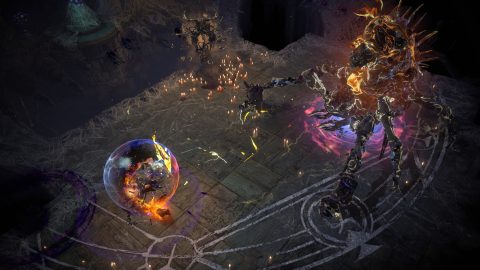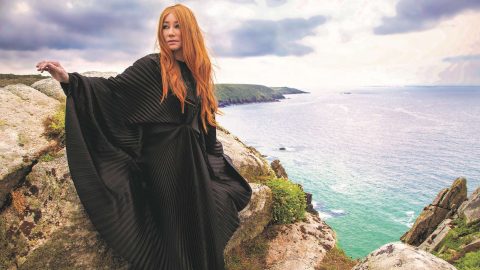
In the space of two gripping singles, The Lounge Society have made it known they’re anything but another face in a bloated post-punk market. Finding fertile ground by embracing their rural upbringing in West Yorkshire’s Pennine towns, and working with label Speedy Wunderground, the teens have struck upon a momentum that laughs in the face of the pandemic.
Their second groove-heavy banger ‘Burn The Heather’ takes aim at local landowners’ pre-grouse shooting ritual of burning the moor-top heather, with deerstalkers, wellies and tweed jackets in the accompanying video. It’s a fresh view on a local issue while saying masses on the wider political dialogue, coming as a cutting statement that’s fully original.
With the band’s first single ‘Generation Game’ arriving soon after first national lockdown back in April, they’ve had to push on regardless of live absence. A testament to their impact comes with the fact that the track became Speedy Wunderground’s fastest selling 7” vinyl – no mean feat given the mouth-watering acts the label has worked with.
Speaking to NME, guitarist Herbie May discusses how the project offered an escapism from small town life, working with Dan Carey, and the importance of hitting the ground running.
Speedy Wunderground usually discover artists in quite interesting circumstances and it feels like a very natural home for you. How did that come about?
“We were very lucky really, we recorded a demo of our first single ‘Generation Game’ and sent a chance email to Dan Carey, he gets hundreds every week but luckily he heard it. It just progressed from there. It’s become a natural home for us, I think our ethos and theirs go together really well. They’re deliberately trying to do things as differently from everyone else as possible and that’s very inspiring. The way they get the track turned around really quickly to capture the live energy is something we were so interested in.”
The track was their fastest selling 7” which must feel like a huge achievement?
“It was a hell of a feeling and we were very proud. That’s what we’re about, we want to make a dent in everything we do and to see that come into fruition was exciting. We knew once that happened the work starts again and you’ve got to try and top it. It just seemed to grow and develop into something special in front of our eyes. To go down with one common purpose between all four of us in the band and those in the studio was really quite powerful.”
You mentioned making a dent in everything you do, that certainly comes through in the listen, you could say there’s a lot of bands sounding the same in the post-punk sphere…
“Absolutely and I think we’re trying to be as far from that as possible. We all believe that music should have an impact if you have that opportunity, music can be a real force for change or at least change within the listener at the very least. To try and have an impact was our goal, so we set out with the direct lyrics and the driving tune to get what we want to express as clearly as possible. We didn’t want to warm into anything, we wanted to get out of the gates as quickly and as dramatically as possible.”
Your identity as a band does embrace a locality, is that important to you?
“We try to filter our local geography and the nature of where we are into our music. From the physical landscape, especially in winter, the brutal rolling hills and the driving rain to being in the valley which obviously does have a disconnect from other areas, you can feel stuck at times however nice it can be, it does become a little bubble that you can feel trapped in. There is a sense of making your own fun, as a teenager it’s almost your duty. Rehearsing and writing songs was where we got most of our joy from, just being mates leaving school and focussing on the band felt amazing. We’ve tried to keep that energy and spirit through everything we do.”
It must have felt really liberating building on those common grounds, local venues must have been more crucial than ever in honing your sound?
“The Golden Lion in Todmorden and the Trades Club in Hebden Bridge have been really essential to crafting who we are. They’re great places for giving bands a start and an opportunity to be completely free with their music and expression because anything goes in those venues, if you can knock out a good tune in any style then they will embrace it and there will always be someone who will like it or be dancing down the front. They’re both amazing venues and we’ll definitely be back there every chance we get. I think it’s essential that people band together to fight for these places, fingers crossed they’ll be back stronger than ever.”

So how did ‘Burn The Heather’ come to be and what was the story behind that?
“There’s a continuing trend where a lot of wealthy local landowners will burn a lot of land for the sake of a bloodsport essentially to shoot grouse and other birds. That contributes to flooding and it’s generally very unpleasant and it can give rural areas a bit of a bad name and we wanted to express how ugly that is. It was just a local teenagers perspective on that lyrically. The groove is quite important to the track itself and to a lot of our music. We really set out to make people dance and make you move while getting across what we wanted to say about local issues and if that has any connection to issues which affect small towns everywhere.”
I guess it smartly loops it into the wider political dialogue right now in many ways?
“It is something that has gone on in the Tory party, over lockdown there were certain rules which seemed to specifically protect fox hunting. For a time you were allowed to go fox hunting but you weren’t able to play football in the park with your mates, so it does apply in other areas albeit in slightly different physical manifestations. The idea that there’s a class of people that have that much desire to kill living animals to the extent of making such brazen acts like that, it is shocking.”
Your music is very much written for live shows, have the circumstances made you more determined to keep that energy and spirit alive in the recordings?
“We’ve had to grit our teeth a little bit without having the energy of an audience in front of us and we’ve had to create that ourselves. Recently when we’ve been rehearsing we’ve essentially been gigging to one another and putting everything into it. When we’re writing and rehearsing tunes we have to imagine there’s an audience in front of us but we’ve doubled down and put as much energy into everything as we possibly can despite there not being anyone in the room.”

You must be delighted with the reaction given the absence of that crucial element?
“We’re very pleased because ‘Generation Game’ came out as we entered the first lockdown and ‘Burn The Heather’ came out as our area got put into another lockdown. On paper there should have been knock backs but the momentum has very much continued. We intend to keep it going, we have a tour scheduled for next May which is obviously a long way off but if they can go ahead then we intend to hit the ground running. To keep momentum going there are going to be a few new things we’re going to be doing through more Covid-centric times and then there will be new music early next year if all things go to plan so that will be quite exciting too.”
It’s still very early days but what are the next steps now?
“We want to build things up but we also want to keep people on their toes, we don’t have much intention of repeating ourselves and so if we can keep it fresh in most things we do then we’ve accomplished our main goal. I think we set out to make sure people can’t really put their finger on us, we like to keep people guessing while still being true to ourselves which is a big task but we give it a go. For example our first two tracks are both very separate in terms of the instrumentation and vibe, we’re hoping to do that a third time and forever really.”
The post The Lounge Society: Yorkshire teens making political punk for the dancefloor appeared first on NME | Music, Film, TV, Gaming & Pop Culture News.







